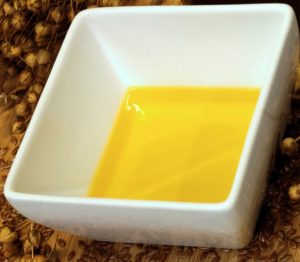Anti-inflammatory, Flaxfarm, Health, OMS, Overcoming Multiple Sclerosis, Vegan
Omega-3: Flaxseed Oil versus Fish Oil
ALA V EPA AND DHA
ALA, Alpha linolenic acid, is basic omega-3. It is the type of omega-3 found in plants.
Flaxseed (which needs to be milled) especially flaxseed oil, is well-known for being the
richest plant source of omega-3, but it is also found in most green plants from grass to
broccoli though obviously these contain hardly any oil and only a small amount of that is
omega-3, so the net amount in those sources is minuscule.
ALA is considered an essential nutrient because the human body (and other mammals) can’t
make it internally, so it has to come from our food. It is as essential to keeping us alive and
healthy as vitamins and minerals. ALA is the “parent” omega-3, the molecule is a chain of 18 atoms of carbon long. From this the other omega-3s (the sorts found in fish oils) with molecules of 20 and 22-carbon atoms are made in the body by various enzymes which lengthen and add extra unsaturated bonds. EPA, eicosapentaenoic acid, and
DHA , docosahexaenoic acid only come from animal sources, including fish oil, but aren’t found in plants. Most people with just a few tiny population exceptions, reliably convert ALA to EPA and DHA. EPA and DHA are then used to combine into structures and compounds within the body.
ALA is well tolerated and utilised by the body, even up to the large doses of some
therapeutic diets, such as the Budwig Diet, around 100ml per day. However, studies have
shown that when people try consuming high doses of fish oil the EPA and DHA are
converted back into ALA in the body.
FLAXSEED (AKA LINSEED) OIL V FISH OILS, PRODUCTION
Flax Farm Flaxseed Oil is an unrefined, cold pressed oil. It is simply top-quality flaxseeds put
under enough pressure to squeeze (some of) the oil out. It is Flax Farm’s primary product.
Fish oil is made from fish parts that are waste by-products of the fish industry. By the time
the fish waste is processed into fish oil, it isn’t very pleasant, so it is highly processed to extract the oil and deodorise it. Along with extracting the pure oil also removes co-nutrients that can help us digest, absorb and metabolise the oil, without these compounds fish oil supplements can be less well tolerated by the stomach than the original fish,
In the past fish industry by-products mainly went into fertiliser and animal feed.
FLAXSEED OIL V FISH OILS, USES
Both Flaxseed oil and fish oils can be bought as capsules.
Fish oil can also be bought as a liquid, it often tastes a bit fishy! though sometimes it is
flavoured to make it more palatable . Good Flaxseed oil such as Flax Farm’s has been a
traditional food throughout Europe and Russia. It is mild, with a pleasant creamy, buttery-
slightly-nutty flavour, that is easy to incorporate into savoury and sweet foods, from salad
dressing to baking; porridge to soups and mashed potato. Another advantage of Flaxseed
Oil is that it is anti-inflammatory and can be used in food instead of inflammatory fats and
oils such as butter, shop bought salad dressing, even olive oil (which contains a significant
quantity of the inflammatory fat LA, omega-6 but no omega-3).
Using Flax oil in place of other more inflammatory oils and fats has a two-fold advantage.
- You lower your intake of inflammatory omega-6 and saturated fats.
- You increase your intake of omega-3 and that results in a much-improved omega-3: omega-6 balance.
Flaxseed oil should not be cooked with at high temperature so roasting and frying are out,
but it is fine to add it to cooked veg, soup etc.

ESSENTIAL FATTY ACIDS OMEGA-3 AND OMEGA-3
Omega-3 is so important that the body is careful to hang on to it when it can, but times of
stress and inflammation, which can be accident, illness or emotional, reserves of omega-3
can be used up, leaving us unable to cope with further stress which can result in
inflammation that gets out of hand. Often these inflammatory conditions respond well to
omega-3 (and a healthier diet) hence there are many protocols based on flaxseed oil.
Omega-6 the other fatty acid is also essential.
The body requires these two essential fatty acids in the ratio of one part omega-3 to three
parts omega-6. From this the body makes structures like cell membranes and uses omega-6
to make the necessary inflammatory hormones that fight infection and help heal injuries.
Omega-3 then makes the anti-inflammatory hormones to keep the inflammation in check.
SCIENCE
Laboratory studies into omega-3 in the past, gave the impression that fish oil was technically
the better omega-3. The OMS protocol which is based on omega-3, originally recommended
fish oil, based on the old science. The 2011 OMS holism study found the improvements in
symptoms, from using flax oil were so much better (62% improvement of symptoms)
compared to the fish oil users. These results instigated the Overcoming MS Organisation to
recommended ditching the fish oil and just using Flaxseed Oil,
LINKS
https://overcomingms.org/latest/new-holism-study-a-long-term-high-quality-diet-reduces-the-risk-
of-disability-progression/
https://www.flaxfarm.co.uk/holism-study
The Budwig Diet (Budwig-diet.co.uk)

